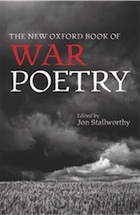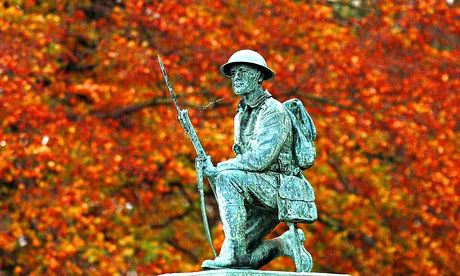This week marks a century since the outbreak of the first world war. Chosen from 1,000 years of English writing about war, poet and Oxford professor Jon Stallworthy selects some of the best attempts to think through this most extreme of human experiences
Celebration and lament … the war memorial at Shildon, near Sedgefield. Photograph: John Giles/PA
"Poetry," Wordsworth reminds us, "is the spontaneous overflow of powerful feelings", and there can be no area of human experience that has generated a wider range of powerful feelings than war: hope and fear; exhilaration and humiliation; hatred – not only for the enemy, but also for generals, politicians, and war-profiteers; love – for fellow soldiers, for women and children left behind, for country (often) and cause (occasionally).
 Man's early war-songs and love-songs were generally exhortations to action, or celebrations of action, in one or other field, but no such similarity exists between what we now more broadly define as love poetry and war poetry. Whereas most love poems have been in favour of love, much – and most recent – war poetry has been implicitly, if not explicitly, anti-war. So long as warrior met warrior in equal combat with sword or lance, poets could celebrate their courage and chivalry, but as technology put ever-increasing distance between combatants and, then, ceased to distinguish between combatant and civilian, poets more and more responded to "man's inhumanity to man". I have chosen poems from both the old "heroic" and the modern "humane" traditions. With so many fine poems to choose from, on another day I might have selected another team
Man's early war-songs and love-songs were generally exhortations to action, or celebrations of action, in one or other field, but no such similarity exists between what we now more broadly define as love poetry and war poetry. Whereas most love poems have been in favour of love, much – and most recent – war poetry has been implicitly, if not explicitly, anti-war. So long as warrior met warrior in equal combat with sword or lance, poets could celebrate their courage and chivalry, but as technology put ever-increasing distance between combatants and, then, ceased to distinguish between combatant and civilian, poets more and more responded to "man's inhumanity to man". I have chosen poems from both the old "heroic" and the modern "humane" traditions. With so many fine poems to choose from, on another day I might have selected another team
More
and then Read more writers' top 10s
 Man's early war-songs and love-songs were generally exhortations to action, or celebrations of action, in one or other field, but no such similarity exists between what we now more broadly define as love poetry and war poetry. Whereas most love poems have been in favour of love, much – and most recent – war poetry has been implicitly, if not explicitly, anti-war. So long as warrior met warrior in equal combat with sword or lance, poets could celebrate their courage and chivalry, but as technology put ever-increasing distance between combatants and, then, ceased to distinguish between combatant and civilian, poets more and more responded to "man's inhumanity to man". I have chosen poems from both the old "heroic" and the modern "humane" traditions. With so many fine poems to choose from, on another day I might have selected another team
Man's early war-songs and love-songs were generally exhortations to action, or celebrations of action, in one or other field, but no such similarity exists between what we now more broadly define as love poetry and war poetry. Whereas most love poems have been in favour of love, much – and most recent – war poetry has been implicitly, if not explicitly, anti-war. So long as warrior met warrior in equal combat with sword or lance, poets could celebrate their courage and chivalry, but as technology put ever-increasing distance between combatants and, then, ceased to distinguish between combatant and civilian, poets more and more responded to "man's inhumanity to man". I have chosen poems from both the old "heroic" and the modern "humane" traditions. With so many fine poems to choose from, on another day I might have selected another teamMore
and then Read more writers' top 10s

No comments:
Post a Comment